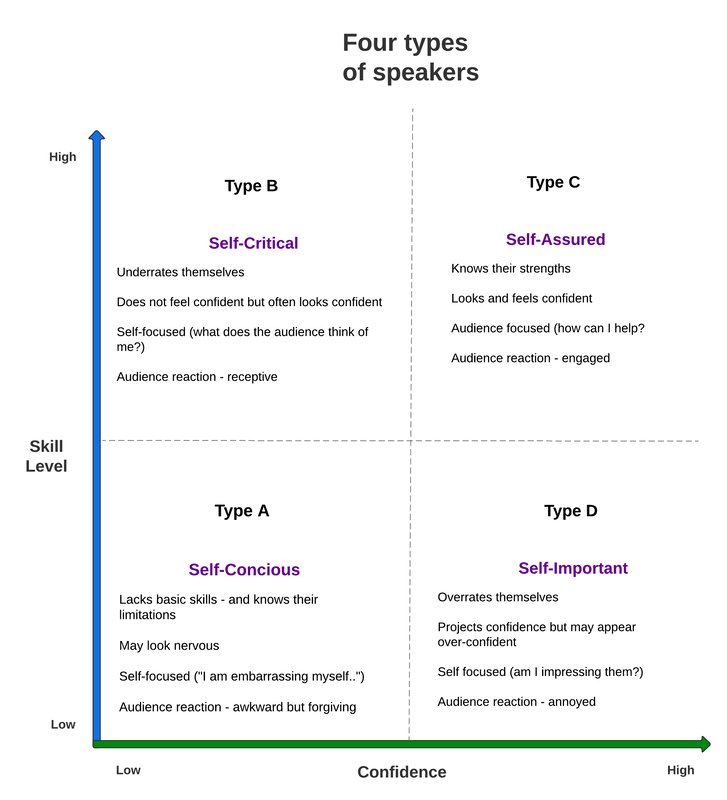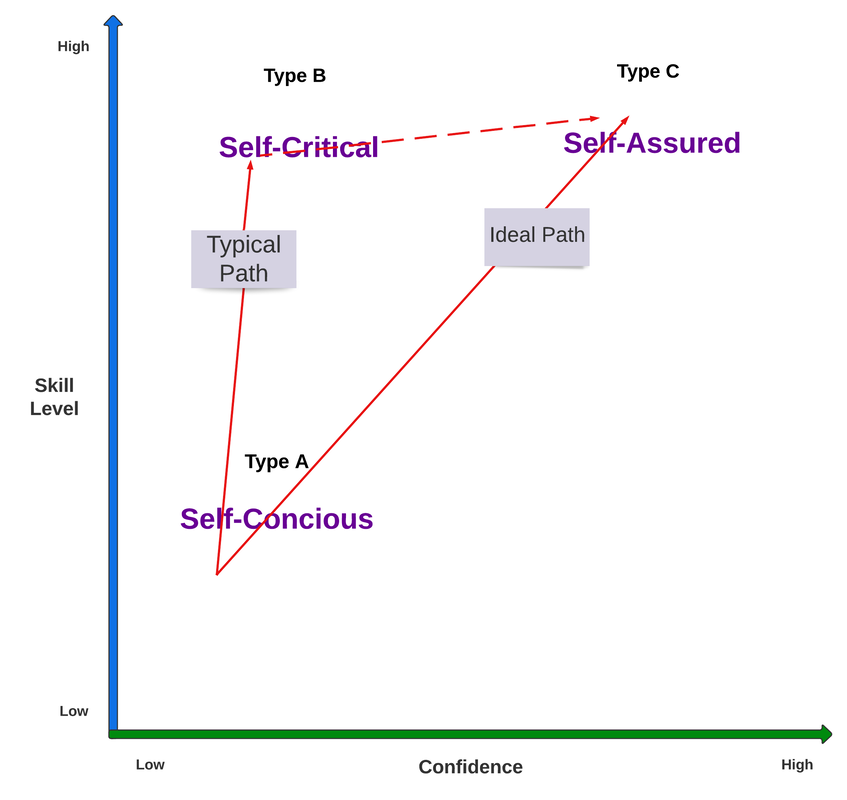If you are an anxious speaker, you have probably decided you are rubbish at it – but, as this article explains, you may well be underrating your abilities.
Four types of public speaker
The diagram above shows four types of ‘typical’ speakers.
Let me start with the Type D speaker because they are unlike the other three. The Type D speaker is “self-important” – full of themselves. The Type D speaker is a bore – they care more about impressing than benefiting the audience and often come across as cocky or arrogant. The Type D speaker may appear super confident but usually lacks basic public speaking skills like getting to the point! They tend to ramble, go over time and divide opinions on whether they have anything worthwhile to say.
The Type D speaker may annoy or irritate the audience, but the speaker is typically oblivious.
The Type D speaker often remains so for life – although some eventually gain humility (when confronted with failure).
We have all come across Type D speakers, and I have no further insights to offer!
The Type A speaker is an inexperienced speaker. They don’t know how to put together or deliver a good presentation, and due to their skill deficit, they look nervous. They worry what the audience thinks and because they are intensely aware of their shortcomings – they are “self-conscious”.
The Type A speaker may make the audience feel a bit uncomfortable or awkward – although many audiences are quite forgiving.
The Type B speaker is the most interesting and arguably the most common. I have called this speaker “self-critical”. It might sound similar to Type A, but the Type B speaker has some skills – they might not be brilliant, but they are much better than they believe themselves to be. They are often well-regarded by their colleagues and almost always look much more confident than they feel.
The Type B speaker will believe that the audience is judging them -but typically, the audience is receptive and interested in what they have to say.
Many people who sign up for my public speaking courses are Type B speakers. They lack self-belief rather than skills. Like Type A and D speakers, they are thinking more about themselves than their audience, which is what is holding them back from being great speakers. They can become engaging speakers if they get out of their own heads!
The Type C speaker is the one we all aspire to be. They are self-assured – great speakers, and comfortable in their own skin. They look and feel confident without being arrogant. As audience members, we feel they care about us – their only motivation is to give us something of value. The Type C speaker is the only speaker focused more on the audience than themselves. They don’t set out to impress us – but ironically, this is precisely what they achieve!
The Type C speaker will easily engage the audience.
Paths to becoming the self-assured speaker
We all want to become a Type C speaker. Ideally, you progress from self-conscious to self-assured as you become a better speaker – i.e., your confidence increases in line with skills or competence. But the more typical path is to go from self-conscious to self-critical – your confidence grows much slower than your competence.
I have shown this in the diagram below.
I consider it part of my job to get people onto this path! The challenge is that I need to get people to believe that they are Type B speakers first.
Why Type B speakers don’t know it
Take a moment to think about what type of speaker you are. You have probably decided you are Type A or C. Almost no one considers themselves to be a Type B or D speaker! Type D speakers think they are Type Cs. Type B speakers think they are Type As. They know they lack confidence, but they put it down to being a poor speaker rather than a poor judge of their own speaking ability.
I often ask groups to decide whether they think they look more or less confident than the average speaker. These are general audiences – not high-anxiety audiences. Typically fewer than 10% of people identify themselves as looking more confident than average. This tells me that around 40% of the room does not realise that they look more confident than the average speaker.
There are two ways to determine whether you are a Type B. The first is to ask for honest feedback from others. If you consistently get good feedback, the chances are high that you are a Type B speaker. But here is the next problem – you still won’t believe it! You will dismiss it as people being kind and sparing you from their honest appraisal.
The second way is to watch yourself on video! I know – the thought is horrifying! But most Type B speakers are pleasantly surprised. There is a cringe factor to get over – but if you can look at yourself objectively, you may recognise that you are better than you imagined. Sometimes waiting a few days or longer works best – putting some distance between you and the event makes it easier to recognise what you did well.
Many people need both – others to tell them they are doing fine and seeing themselves to confirm it. I see this frequently in my courses. Someone does an excellent presentation and gets good feedback from everyone in the room. They look surprised but also doubtful – until they watch the video (yes, I record people!) and come back acknowledging that it was not as bad as they thought.
How to counter the self-doubt
Perhaps you now have an inkling that you are a Type B speaker. You remember you have had some good feedback in the past and even some OK experiences of public speaking.
You don’t want to be a Type B speaker – it’s not fun and stops you from becoming a Type C speaker. Type B speakers tend to get stuck because they start avoiding public speaking.
So, what can you do about it?
Realising that you are a Type B speaker is often all it takes. By becoming aware of the stories that you have been telling yourself and the mismatch between your perception and others’ perceptions, you gain confidence and can progress to becoming a self-assured speaker.
Remember I said the Type C speaker is the only one focused on the audience? If you shift your focus from ‘what do people think of me?’ to ‘how can I help?’ your audience will sense this, and you will automatically gain their approval. I have written about this before – I have called it having a ‘service mindset’ or focusing on your ‘why’.
Here is an example. I train people who work for local government and present advice to elected members. Many of them find this terrifying! They are worried about questions and being put on the spot.
I encourage them to welcome questions. I point out that politicians (regardless of what we think of them!) have a hard job. If the presenter can go into a meeting with the attitude of “how can I help these people to make a difficult decision?” rather than “are they going to ask something I can’t answer?” or “how is this going to go for me?” they are likely to do a better job.
Why are you there? To inform your audience? To help them understand something? To persuade them to do something? If you can think about your why – your purpose, your message, and how you can serve your audience, you will be less nervous and a better speaker!
Most public speaking courses focus on skills. But a good coach will help you gain confidence faster than skills. A coach can get you on the path to becoming self-assured by helping you recognise that you are being held back by self criticism and self-doubt more than ability.


